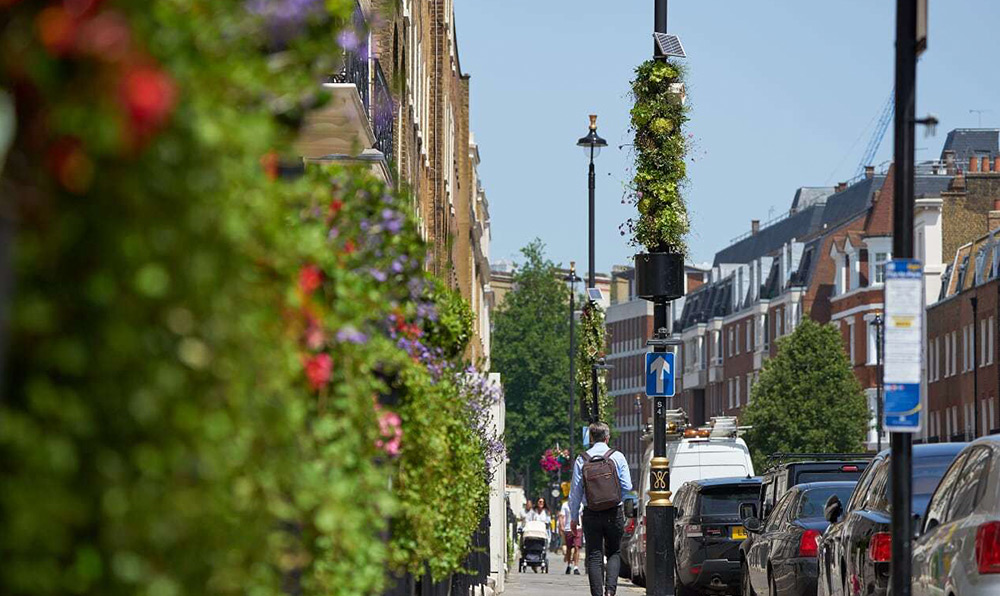
Greening The City
How amazing would it be, once life returns to the shops and offices at the heart of our city, to hear a bird singing, or the buzz of pollinating insects as we make our way down a busy street?

Angus Cunningham, Scotscape CEO
The rustle of leaves or scent wafting from brightly coloured flowers would lift the spirits and boost wellbeing in roads lined with concrete and asphalt. Plants in the city are powerful allies for meeting our environmental goals of cleaner air and net zero carbon, too, as they scrub greenhouse gases and fuel particulates from the atmosphere and emit oxygen.
But just how to bring nature sustainably back into our congested streets is a riddle that has puzzled city planners for years.
LivingPillars™
Now urban greening specialist Angus Cunningham and his firm Scotscape have come up with an ingenious solution. If there is no room to plant a tree, they reasoned, then why not create a tree – by installing a living pillar of greenery on a structure that every London street has in plenty: lampposts. Such LivingPillars™ could be installed down any street, providing green corridors that link London’s parks and bringing wildlife biodiversity into even the greyest corner.
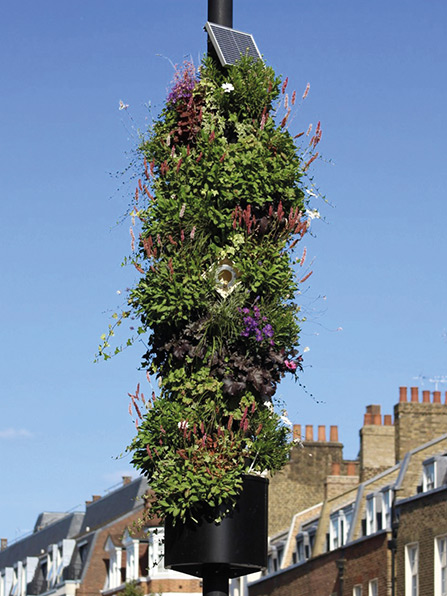
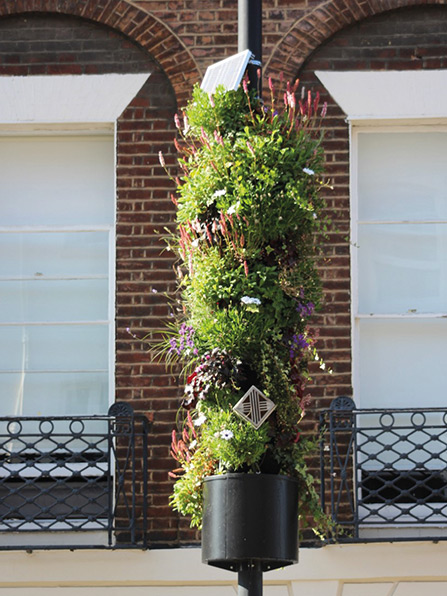
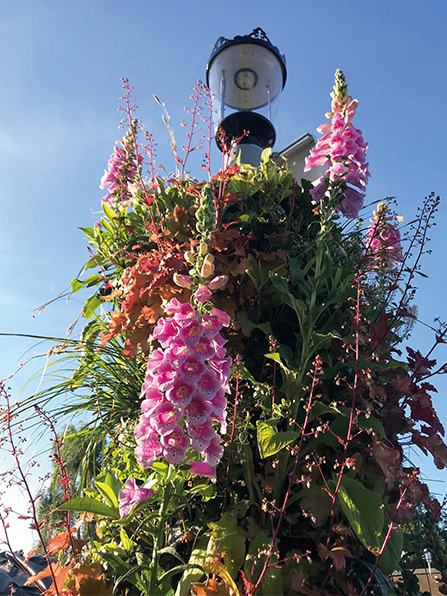
Scotscape, founded in Wimbledon and now based in Surbiton, was building on 10 years’ expertise in creating living walls for prestige clients ranging from Porsche to the All England Lawn Tennis Club, so already had the skills needed to bring this new idea to life. They knew which plants were resilient enough to cope with the breeze five metres above ground level: so many plants, in fact, that Scotscape offers a range of planting schemes, with some offering colour, others best at cleaning the air and others still attracting beneficial insects.
A Cornish company manufactures the water reservoirs that hug the post above the heads of pedestrians. Rising above the reservoir, the post is wrapped in layers of a special fytotextile, and plants with individual pads of compost are inserted through it, their roots spreading throughout unseen. Water is pumped to the top of the textile, the pump powered by a solar energy cell, and trickles downwards, with excess caught in the reservoir and reused. In amongst the waving branches nestle bird boxes and insect hotels.
Greening the street
The first and highly successful LivingPillars™ were retrofitted onto existing lamp posts in Ebury Street Belgravia for Grosvenor Britain and Ireland. These prototypes… sparked further ideas for improvements. Working with lighting and technology experts, Scotscape has come up with purpose-built living lampposts, which boast integrated sensors to check moisture levels and alert the client when the water reservoir is running low via a dashboard-style app. The pillars can also relay information about pollution levels and air quality. The latest design is installed at The Old Post Office in Islington.
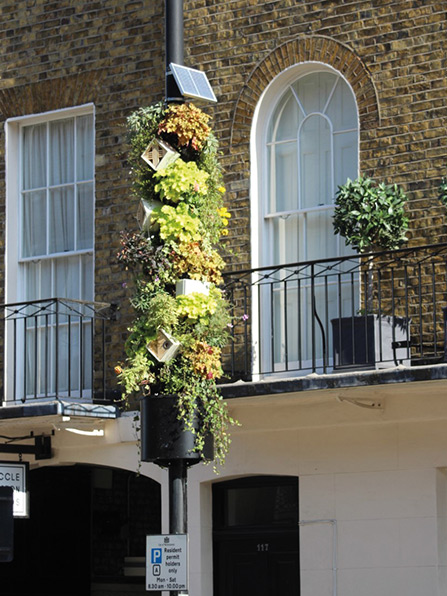
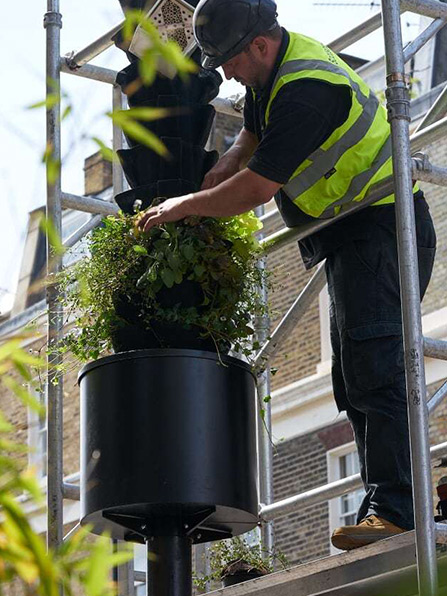
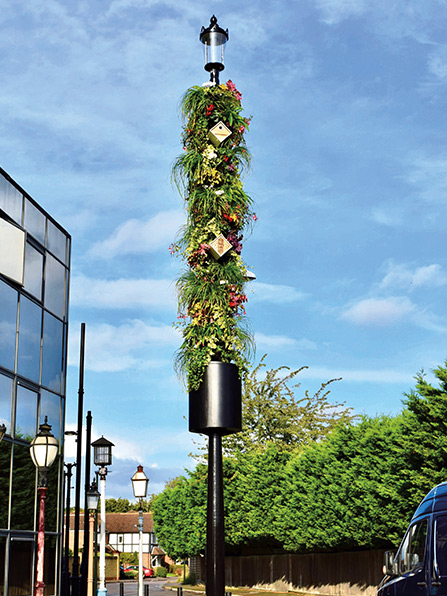
Scotscape now hopes that councils, business improvement district and shopping malls will see the unique benefits of living pillars in bringing biodiversity to the built environment, whilst costing less than a street tree.
Ebury Street brings a glow of nostalgia to Angus Cunningham, who 30 years ago got lost there after stepping off the Edinburgh bus at Victoria coach station as a wide-eyed university dropout with just £20 in his pocket. Now the boss of his own Company which is influencing city planting he reminices: ‘’It feels like I have come full circle!…. and in doing that I discovered the streets weren’t paved with gold but maybe the value is in making them green?’
Fact File: Plants resilient to urban life
1. Hebe – evergreen, long-flowering New Zealand shrub
2. Hedera helix (ivy) – ubiquitous climber with golf-ball sized flowers in February
3. Mahonia japonica – striking, spiky-leaved evergreen with sweet-scented yellow flowers
4. Muehlenbeckia complexa – a tough New Zealand climbing shrub, resembles a Womble
5. Pinus mugo – Angus’s favourite, a charming dwarf pine with tufts of long, flexible needles
6. Sarcocca confusa – low, evergreen shrub with honey-scented winter flowers and black berries
Scotscape 020 8254 5000,
www.scotscape.co.uk
angus.cunningham@scotscape.co.uk






